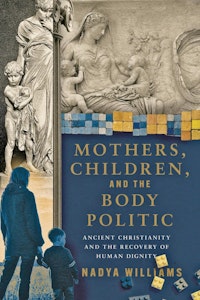This article is taken from the April 2025 issue of The Critic. To get the full magazine why not subscribe? Right now we’re offering five issues for just £10.
Are we “repaganising”? Louise Perry says yes. Tom Holland thinks we’re still a deeply Christian culture. If we are indeed shedding the last vestiges of Christian morality, is that something to celebrate or fear? Nadya Williams enters the debate with her new book, Mothers, Children, and the Body Politic, in which she draws convincing parallels between pre-Christian and contemporary morality. At the core of the work is her argument that “the default, history shows, has been and continues to be the embrace of death”.
This, for Williams, is most evident in the treatment of what she terms “the useless ones”: people who, being unprofitable for the economy, were often despised and neglected in pagan societies. For example, parents exposed their unwanted newborns — especially if visibly disabled — leaving them to die unless rescued and adopted. The infirm were also seen as an economic burden, “worth more dead than alive”.
Our moral assumptions are closer to being a heretical form of Christianity than actually pagan
Similarly, “since unmarried women could not produce legally born children who might grow to contribute to the war effort … they had no value in the pre-Christian pagan worldview”.
Williams’s scope is wide. She vividly retells stories from Homer’s epics and ancient Greek tragedy through to the martyrdom of the early Christian saints Felicity and Perpetua. If she doesn’t home in on a time or place more specific than the “ancient Mediterranean”, it’s because she doesn’t need to. Her point is precisely that across different ancient cultures, the absence of any concept of innate human dignity remains consistent.
As we lose a sense of us all being made in the image of God, Williams argues that it is unsurprising if we should become alienated from a Christian framework which seeks to protect the most vulnerable. “Human lives,” she writes, are considered “a necessary cost whenever there is no philosophical or theological framework for valuing them … it is difficult to overemphasize just how revolutionary the idea of the imago Dei was in antiquity and continues to be within all philosophical systems of world history.” It’s Christianity that is the historical anomaly.
So what evidence do we have that we are reverting to a pagan valuing of the strong over the weak? Williams points us first to the treatment of mothers and children, citing the push for ever more liberal abortion laws, along with practices such as IVF and surrogacy, as examples of the commodification of human life. She sees the same kind of commodification in the introduction of government-sponsored euthanasia (MAID) in Canada. Since the publication of her book, of course, Kim Leadbeater’s assisted dying bill has passed its second reading in Parliament.
Here is where, while looking at the same symptoms, I arrive at a different diagnosis from Williams. For although she is correct that, in our practices, we resemble pre-Christian societies, I believe our moral assumptions are closer to being a heretical form of Christianity than actually pagan. The debate around assisted dying in the UK exemplifies this perfectly: if we were “repaganising”, then support for assisted dying would be greater because the the elderly and seriously ill would be seen as a drain on the economy.

But, with the exception of a small — if vocal — minority, that’s not the prevailing rhetoric. Instead, campaigners appeal to two goods: maintaining bodily autonomy through choice and exercising compassion through the removal of bodily or mental suffering.
Both of these goods come from a distinctly Christian understanding of morality, though they are distortions of it. In Christianity, the body is considered sacred as being made in the image of God, and thus it should not be commodified or harmed by others. But our contemporary heretical iteration of this belief justifies euthanasia by arguing that the body may be harmed, if the individual chooses it for himself. Similarly, while mercy towards the suffering and sick is a Christian virtue, its heretical equivalent proposes extinguishing the suffering life altogether.
Isn’t this all just semantics? I think not. Two illnesses can look the same but have very different cures. If we wish to protect the vulnerable members of our society, we must first understand that our current moral framework is neither pagan nor Christian any longer. Although Williams’s book rightly cautions us against the danger of losing the Christian foundations of our civilisation, I’m not sure which is ultimately more threatening: a return to outright paganism or a disdain for human life justified by Christian virtues gone mad.







